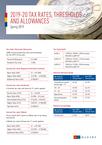
Changes on the Payroll Horizon
New rules to payslip layout
From April 2019, a payslip must show the total number of variable hours an employee has worked.
For example, if they have worked overtime, the number of hours they work changes each pay period, or the rate they get for working certain hours differs, the variable hours and rates must be documented on their payslip.
Childcare Vouchers & Tax-Free Childcare
In October 2018, the employer supported childcare voucher arrangement closed to new applicants. For any employees that joined before this date, they can still receive childcare vouchers to help pay for the costs of qualifying childcare.
Commonly operated via salary sacrifice, it means an employee gives up pay in exchange for a voucher free from both income tax and NIC. For any employee who continues to participate in this arrangement, a basic earnings assessment needs to be carried out at the beginning of each tax year to establish the amount of childcare vouchers they can receive.
If an employee joined the arrangement prior to 6 April 2011, then the maximum amount of £55 per week or £243 per month can be provided without an income tax or NIC charge arising, regardless of earnings.
For all those employees who did not join or were unable to after October 2018, they can participate in the Government’s Tax-Free Childcare scheme. This does not involve the employer and is a direct arrangement between the employee and the Government to help provide income tax relief on qualifying childcare support.
The Apprenticeship Levy, Employment Allowance and the connected companies rule
For the 2019-20 tax year, every qualifying employer can receive the following:
- An Apprenticeship Levy Allowance of up to £15,000. This means you only pay the Apprenticeship Levy charge of 0.5% on a paybill that is more than £3m (i.e. £3m x 0.5% - £15,000);
- An Employment Allowance of up to £3,000. This is a credit that qualifying employer can use to offset their employer Class 1 (secondary) NIC bill.
It is important to be aware that, if you are part of a group of connected companies or charities that each have payroll costs, only one Apprenticeship Levy Allowance and one Employment Allowance will each be available across the whole group.
It is up to the group to decide how they will use the Apprenticeship Levy and Employment Allowances (i.e. which PAYE Reference(s) it is used against).
Additionally, it is important to remember that the Employment Allowance is not available to the following:
- A company where you are the director and the only employee paid above the Secondary Threshold
- You employ someone for personal, household or domestic work (like a nanny or gardener) - unless they’re a care or support worker
- You are public body or business and more than half your work is in the public sector (like local councils and NHS services) - unless you’re a charity
- You are a service company working under ‘IR35 rules’ and your only income is the earnings of the intermediary (like your personal service company, limited company or partnership)
Auto enrolment
From 6 April 2019, the level of contributions that must be paid into an Automatic Enrolment pension scheme will increase.
As an employer, you will now be required to contribute a minimum of 3% towards your employees’ pension plan. Employees will be required to contribute a minimum of 5%, making a total minimum contribution of 8%.
If you wish, both you and your employee can choose to contribute greater amounts to the pension. If you contribute more than the required minimum amount - but less than the total minimum amount - then your employee only needs to make up the shortfall between the total minimum and the employer contribution.
The table below demonstrates the minimum contribution increases from April 2019.
Effective | Employer | Employee | Total |
Up to 05 April 19 | 2% | 3% | 5% |
06 April 19+ | 3% | 5% | 8% |
Note that this may vary for alternative scheme sets or certified schemes. Please liaise with your pension advisor for support and information on this area.
Auto enrolment communications
When an employee is first automatically enrolled, the letter they received from the you will have set out that contribution levels will increase over time.
There are no additional duties under automatic enrolment to advise employees about the minimum increases, though you may wish to do so to help minimise queries, or reduce the number of workers subsequently leaving their schemes.
You should still be mindful of the need to consult your employees if changes are made to the minimum contribution levels before the 6 April
Declaration of compliance
Remember to complete your Declaration of Compliance. This needs to be completed no later than 5 months after your staging date, duties start date or re-enrolment date. You will be fined if you fail to complete this accurately and on time.
Click here to be redirected to The Pensions Regulator website where you can find more information.
Company car tax diesel supplement
If you provide diesel company cars for business and for private use, there is now a requirement to check whether the car meets the Euro Standard 6d to determine if the additional 4% diesel supplement is applicable.
If you are payrolling benefits it is important you provide this information to your payroll contact so individuals pay the correct amount of tax on their benefit.
From September 2018, the Euro standard to which the car has been certified will be shown on the V5c registration document. In addition, the online Vehicle Enquiry Service can also be used to check whether a car meets the standard, so the appropriate diesel supplement can be applied.
Rates, thresholds and allowances
HMRC have published the 2019-20 rates, thresholds and allowances. You can download these here or at the bottom of the page.
If you have any questions on the above, or have any other payroll queries, please get in touch today.

